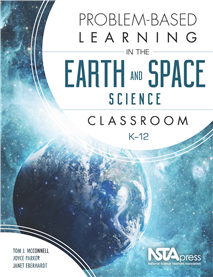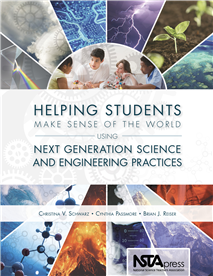All Book Chapters
Book Chapter
In this lesson, students try to explain what happens in the solar eclipse, and why a person in one location can see a solar eclipse while a person in another place cannot. Key words and concepts covered are solar eclipse. Crosscutting concepts explor...
Book Chapter
In this lesson, two friends living across the country from each other see a lunar eclipse at the same time and wonder how it is possible. Key words and concepts covered are lunar eclipse. Crosscutting concepts explored are patterns, scale, proportion...
Book Chapter
In this lesson, a brother and sister learn that Venus is visible as either a morning star or an evening star at different times of the year, and they try to explain the pattern of movement of Venus in the sky. Key words and concepts covered are movem...
Book Chapter
Problem-Based Learning in the Earth and Space Science Classroom, K–12 (Book Sample)
There is a lot to like about this text, and I truly believe that teachers will both like it and use it. Implementing PBL is difficult for teachers, and few curriculum guides are available to support their efforts. This book fills that gap by providin...
Book Chapter
Moving Beyond “Knowing” About Science to Making Sense of the World
This chapter introduces the book and explores the fundamental shifts implied by engaging students in science and engineering practices. We have many opportunities to make significant and lasting change in the ways we teach science at the K-12 level. ...
Book Chapter
The Framework, the NGSS, and the Practices of Science
This chapter explicates the rationale for focusing on science and engineering practices and traces the development of this idea from earlier notions of inquiry in science. In going from the Framework to the Next Generation Science Standards (NGSS), t...
Book Chapter
Toward More Equitable Learning in Science
This chapter examines some important questions about equity in the science classroom. It explores how a focus on practices is in line with goals we have to make science accessible, intelligible, and meaningful for all learners. The chapter shares and...
Book Chapter
The Role of Practices in Scientific Literacy
This chapter takes up the question of our broader societal goals for science literacy and explains the connections between these goals and the focus on engaging students in science and engineering practices. All of the activities featured afford stud...
Book Chapter
Asking questions might seem like a practice that is already in widespread use in today’s science classrooms. But the practice of “Asking Questions” as envisioned in the Next Generation Science Standards (NGSS) is not at all common. In this chap...
Book Chapter
Planning and Carrying Out Investigations
In this chapter, we share how different parts of investigations can be designed so that they work together and help students answer questions. In particular, we describe several ways to design effective investigations using examples from elementary c...
Book Chapter
Analyzing and Interpreting Data
In this chapter, to highlight the development of this practice across K–12, a series of classroom examples are presented of analyzing and interpreting data. Each example is followed by a commentary that highlights the salient features of the exampl...
Book Chapter
Using Mathematics and Computational Thinking
Using mathematics and computational thinking practice is all about finding precise ways to describe the patterns and processes that make up scientific and engineered systems. This chapter discusses three interrelated issues for getting started in you...
Book Chapter
In this chapter, we examine student engagement in the science practice of constructing explanations, which is a key practice of science and lies at the core of what the discipline is about. Engaging in explanation construction helps students see how ...
Book Chapter
Engaging in Argument From Evidence
In this chapter, we offer three vignettes of the practice of engaging in argument from evidence. These examples highlight the ways in which the components of engaging in argument from evidence—supported claims, evaluation and critique, and reconcil...
Book Chapter
Obtaining, Evaluating, and Communicating Information
In this chapter, the details of the practice of obtaining, evaluating, and communicating information are outlined and examples and resources provided related to implementing the practice. We hope that this information will help teachers and others le...



